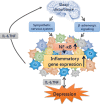Depression in sleep disturbance: A review on a bidirectional relationship, mechanisms and treatment
- PMID: 30734486
- PMCID: PMC6433686
- DOI: 10.1111/jcmm.14170
Depression in sleep disturbance: A review on a bidirectional relationship, mechanisms and treatment
Abstract
Sleep disturbance is the most prominent symptom in depressive patients and was formerly regarded as a main secondary manifestation of depression. However, many longitudinal studies have identified insomnia as an independent risk factor for the development of emerging or recurrent depression among young, middle-aged and older adults. This bidirectional association between sleep disturbance and depression has created a new perspective that sleep problems are no longer an epiphenomenon of depression but a predictive prodromal symptom. In this review, we highlight the treatment of sleep disturbance before, during and after depression, which probably plays an important role in improving outcomes and preventing the recurrence of depression. In clinical practice, pharmacological therapies, including hypnotics and antidepressants, and non-pharmacological therapies are typically applied. A better understanding of the pathophysiological mechanisms between sleep disturbance and depression can help psychiatrists better manage this comorbidity.
Keywords: bidirectional relation; depression; mechanism; sleep disturbance; treatment.
© 2019 The Authors. Journal of Cellular and Molecular Medicine published by John Wiley & Sons Ltd and Foundation for Cellular and Molecular Medicine.
Conflict of interest statement
The authors declare that the research was conducted in the absence of any commercial or financial relationships that could be construed as a potential conflict of interest.
Figures


References
-
- Morin CM, LeBlanc M, Daley M, Gregoire JP, Merette C. Epidemiology of insomnia: prevalence, self‐help treatments, consultations, and determinants of help‐seeking behaviors. Sleep Med. 2006;7(2):123‐130. - PubMed
-
- Ohayon MM. Epidemiology of insomnia: what we know and what we still need to learn. Sleep Med Rev. 2002;6(2):97‐111. - PubMed
-
- Armitage R. Sleep and circadian rhythms in mood disorders. Acta Psychiatr Scand Suppl. 2007;115(433):104–115. - PubMed
-
- Hawkins DR, Taub JM, Van de Castle RL. Extended sleep (hypersomnia) in young depressed patients. Am J Psychiatry. 1985;142(8):905–910. - PubMed
Publication types
MeSH terms
Substances
LinkOut - more resources
Full Text Sources
Other Literature Sources
Medical

